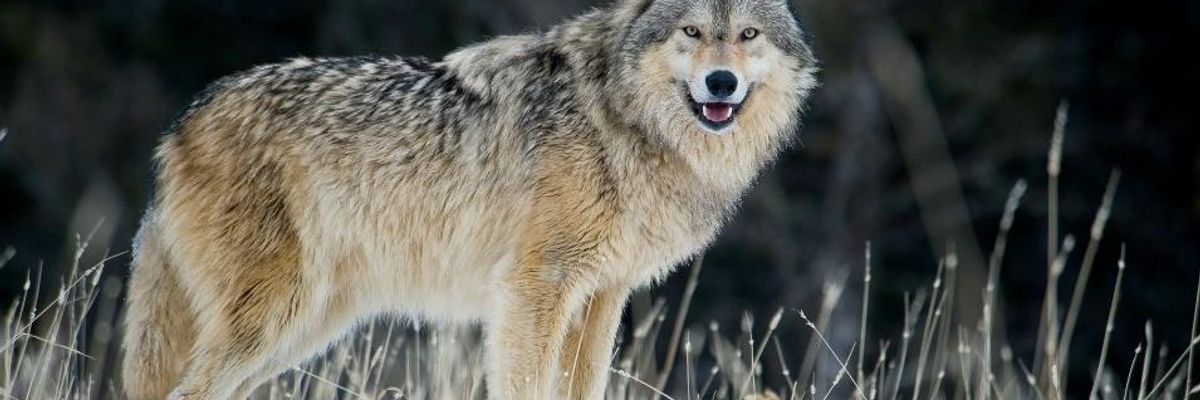Conservation advocates are urging the Biden administration to reinstate federal protections for the gray wolf after Wisconsin hunters far exceeded the state's kill quota last month.
"Wisconsin's actions offer a tragic glimpse of a future without federal wolf protections," said the New York state-based Wolf Conservation Center.
The wolf hunt season opened on Monday, Feb. 22 and ended for all zones by on Wednesday, Feb 24. The season was to have extended to Feb. 28 but the "harvest" numbers forced an early shutdown.
Over those three winter days--during the wolves' breeding season--hunters killed 216 wolves out of the state's estimated 1,000 wolves.
The quota for state hunters had been at 119 wolves. Eighty-one other permits were set aside for Ojibwe tribes.
"This hunt represents an unprecedented and extreme departure from sound, science-based wildlife practices on the part of Wisconsin DNR. No doubt this hunt is an insult to science, democracy, and good conscience," said Wisconsin Sierra Club chapter director Elizabeth Ward.
Beyond the high number and timing, wildlife advocates expressed outrage that the majority of the wolves--86%, according to DNR--were hunted down by dogs, which is legal in the state. Forty-six percent of the casualties were female, prompting concerns about the population's recovery prospects.
The hunt wasn't originally to have taken place in February.
As Wisconsin Public Radioreported last week,
The wolf season was held against the DNR's recommendation that the hunt resume in November. The agency's decision to hold off on a hunt this winter drew backlash from Republican lawmakers and hunters, resulting in a lawsuit filed by a conservative advocacy group on behalf of Kansas-based Hunter Nation.
The group sought a court order to force the DNR to resume the hunt, and a Jefferson County judge sided with the hunting organization earlier this month. The agency asked an appeals court to put that ruling on hold, but a panel of judges dismissed the DNR's appeal last week.
Hunter Nation, whose board of directors includes former Kansas Secretary of State and Trump ally Kris Kobach, said in a statement Friday that it was "proud" of the intervention it took and praised the hunters for helping manage the state's wolf population.
The hunt was allowed thanks to an action in the waning days of the Trump administration.
The gray wolf was officially stripped of its Endangered Species protections on January 4--a decision that elicited fierce outcry from biodiversity advocates who said it was a "reckless" decision based on bad science that would likely spell doom for the iconic species.
Wayne Pacelle, president of Animal Wellness Action, decried Wisconsin's hunt, writing in an op-ed at AgUpdate: "This assault on wolves during their breeding season is a dark expression of our worst instincts as a species, it is predicated on outdated mentalities toward wolves, and it is a practical example of precisely why the federal government was well-justified in shielding wolves from vengeful, politically driven actions and listing them as protected under the Endangered Species Act."
In a Humane Society blog post, Kitty Block and Sara Amundson urged the Biden administration to act.
They called the Wisconsin hunt a "no-holds-barred carnage of wolves" that "offers a terrible glimpse into just what lies ahead for these beloved native American carnivores unless the Biden administration moves swiftly to restore their federal protections."
DNR, for its part, said in a statement Wednesday that it's "actively working to prepare for a fall 2021 wolf harvest season through a transparent and science-based process."
